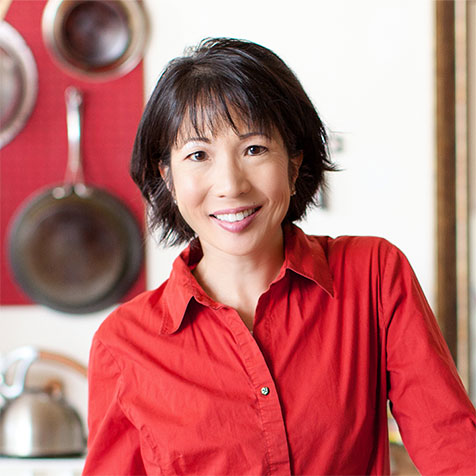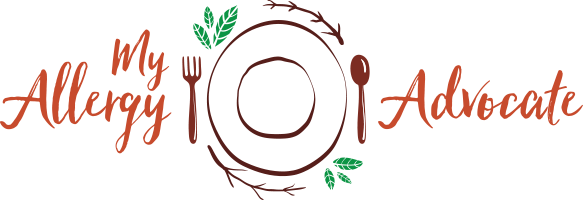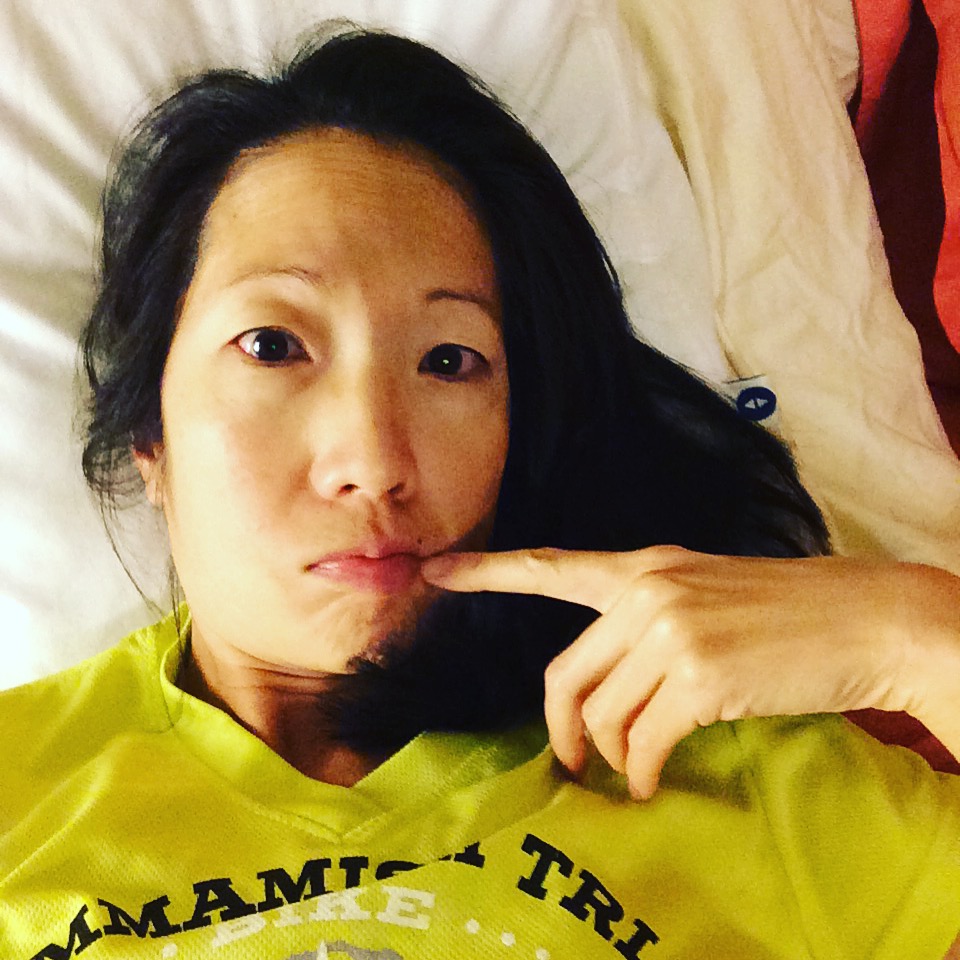
Food allergies and intolerances got you down? Read here about why I don’t feel sorry for myself, and why you don’t need to either.
“Oh my gawd! You have so many food allergies! What on earth do you eat? I feel so sorry for you.”
For the last two years, this is what I hear from the servers and chefs of restaurants as they write down my prohibitory list of food allergies and intolerances. About two weeks ago, a different response to those words flowed from my tongue.
Why do you feel sorry for me? I don’t.
It fell out of my mouth so quickly, I even surprised myself.
And here is why I don’t feel sorry for myself.
#1. A life with multiple food allergies and intolerances has made me healthier, not sicker.
When people encounter my food allergen and intolerance list, they seize up with projected fear. “What would I do if I couldn’t eat so many things?” They conjure up the word, “Restriction,” and somehow it translates into the idea of malnutrition, possibly through the route of absence.
If we’re talking strictly about micronutrients and calories, there isn’t a micronutrient that I cannot ingest in some shape or form. Without dairy, I get my calcium from other foods besides milk and cheese. With wheat-based breads and pastas, I get my carbohydrates from vegetables, fruits, and a small amount of brown rice.
Wanna know something else? When people who do not have food allergies or intolerances follow a similar nutritional plan as I do (a combination of Metabolic Efficiency nutrition, Paleo, Gluten-free and Grain Free, and AIP) they eat heartily, lose weight, and feel more energetic. I’m going to guess that after the initial week of adjustment to absence of processed sugars, they sleep better too!
For people like me who have difficulty hanging onto weight unless you eat like you are a small army, it one of the only nutritional strategies that is sustainable. At the time of this writing, I have been able to maintain my weight in my ideal weight range for my activity level and performance expectations for four months.
My “restrictive diet” is FREEDOM, not deprivation. I have never been more healthy overall in my entire adult life than the time between the last bout of Leaky Gut Syndrome and today. And it feels like the Energizer Bunny inhabited my body and decided to take up residence.
#2. My food allergies and intolerances have changed the way I think about food forever. Food is medicine.
I remember a day that I was eating a meal out in a small Indian restaurant during lunchtime. Alone and mildly bored, I took out a book and started to read. When the food arrived, I kept reading my book and eating. The server, a young Indian man, came by to ask me about the meal, and I probably gave a courteous, “Good, fine,” response.
“When you eat, you should pay attention to your food,” he said.
That statement was my first introduction to Mindfulness and Eating.
Food is medicine to me. Food healed my body, as there is no pill and no cure for Celiac Disease (yet!). The only treatment for Celiac Disease and food allergies is the elimination of gluten and any triggering foods from the diet.
Food is not just for entertainment, such as eating fake butter popcorn and Sour Patch Kids at the movie theater. Eating is not just because your stomach is grumbling. It is not just something you should insert in your mouth while your mind is consumed with thoughts of something else. It is a mental, emotional, physical, spiritual, and in many cases academic and scientific act when you are feeding yourself.
Conscious choices of what you eat, where you eat, how you eat, when you eat, why you eat, and with whom you eat your meals are part of the way we fuel, heal, and truly nourish our bodies for the living, loving, and adventures of both our mundane activities and our wildest dreams (and everything in between).
The reality of my food allergies and intolerances makes it an imperative to avoid foods and treats that others can indulge in without much thought. The Kit Kat bar that you can eat is the same bar that might send me to the hospital with projectile vomiting. Once that neural pathway is set (i.e. Kit Kat bar = projectile vomiting), the temptation to eat a Kit Kat bar is utterly destroyed. A new one is created: I have lusty thoughts about the one time of the year I want to have piece of dark chocolate flourless cake, which is usually on my birthday. Birthday = flourless cake.
Good food is medicine. Food heals. Food repairs damage. Food reverses aspects of some diseases. Food nourishes. Food satisfies and satiates.
Yet food won’t do any of those things if you interact with food as if your body is a garbage compactor and a food disposal. You are neither. Your body is the most expensive and valuable piece of mobile real estate you will ever own in your lifetime.
And for the record, flourless cake won’t heal anything physically in me, but it’s still a spiritual experience, no? And so, I make room in my nutrition plan for flourless cake on my birthday. And I don’t mind at all that I generally don’t eat desserts except on special occasions.
#3. Having food allergies have taught me to convert disadvantage into advantage, and turn difficult situations into problem-solving masterpieces.
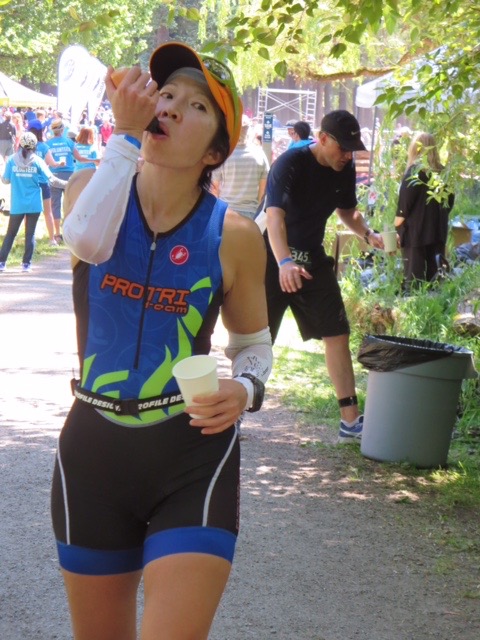
Learning to deal with food allergies is challenging situations gives you transferrable skills in other arenas of life.
This year, I had the opportunity to race my first 70.3 triathlon in Victoria, BC. The distance, a 1.2 mile swim followed by a 56-mile bike ride followed by a 13.1 mile run, is a fun and challenging distance, and is considered the “gateway drug” to the full Ironman. You take the finish time of the 70.3 race, double it, and add one hour, and that becomes your projected Ironman finish time of a race with comparable conditions.
Lining myself up with other athletes of my age, gender, and approximate power to weight ratio, I fall right in the middle, and my performances are neither stellar nor slacking. What is more interesting is that all my inherent disadvantages come into play when it comes to nutrition.
Typically, race courses provide race food in the form of gels and bananas, electrolyte fluids, and water at aid stations throughout the bike and run course. My disadvantage is that I cannot take anything off the race course tables except water. I am a self-supported athlete, and the longer the race, the more complex the challenge.
Instead of giving up, I took four months of experimenting in my kitchen and testing my own race food that I could slurp out of a gel flask, and tested them on my own tummy on the weekends with longer and longer distances. I kept notes on how often I needed food, how much water, whether my tummy responded negatively or positively, and whether I felt fatigued at the end of each training. At Victoria, I consumed only my food during the race at an average consumption rate of 41 calories of carbohydrate and digestible protein per hour, approximately one-third of the low end of the recommended amount for the average triathlete. I am not surprised that I encountered a number of athletes on the run course who were having GI troubles that slowed them to a walk.
The outcome isn’t really my point here. My point is that my brain took four months to create, test, and validate an option for me that would work. It’s the process that is the gold.
If you are willing to attack your disadvantages and come up with workable solutions regarding complex food issues, you will discover a transferable skill in taking on just about anything in life.
When I encounter complex problems and issues in my work with clients, I notice that I look for the same patterns and process that I used to encounter my own. I look for ways to turn disadvantage into advantage, and I capitalize on what is working well all by itself. In essence, I minimize the weakest link by eliminating its effect, and I maximize strengths.
I may never be able to consume a twice-baked almond croissant in this lifetime. But I endeavor to be that person who at 78, 79, and 80 years old is still hiking, jogging, kayaking, and traveling the world with a lot of mobility, vigor, and enthusiasm. Should I be surprised that I don’t really crave twice-baked almond croissants anymore? But I do crave running and traveling like a fiend!
On the horizon, I have two large challenges to face. They have some weighty decisions attached to them, and Resistance would say that I am not ready for the challenge. Yet by turning disadvantage into advantage, I have learned to tell Resistance to bugger off, to commit to a process of growth and change, and to take on my big, hairy, audacious goals.
My Allergy Advocate’s Seven-Day Challenge
COMING SOON!
Having serious food allergies, intolerances, and Celiac Disease has changed me. They have changed me for the better! Whether you have food allergies or not, consider how a change in the way you relate to food can transform not just the way you eat but the way you approach life in general.
One way you can do this is to consider taking on MAA’s 7 Day Cook-At-Home/Eat In Challenge (*insert the sound of trumpets and fanfare*). Please return to the blog early next week for details on how you can take on this 7-Day Challenge with my support. I’ll supply you with resources, tips, and hacks on how to make this easy and simple.
Yes, I know we’re almost in that time of year when our holidays are food-centric, and going out to eat is the rage. This is the PERFECT time to take on this challenge, and eat the best you ever have while enjoying food you cook in your very own kitchen and take with you wherever you go.
Let’s get cooking, shall we? Please indicate your choice of week to participate, and I’ll get that choice rolled out for our community to participate together [polldaddy poll=9178651]


